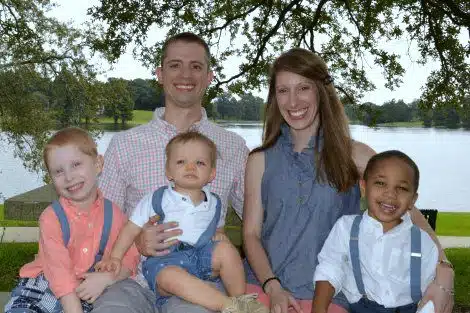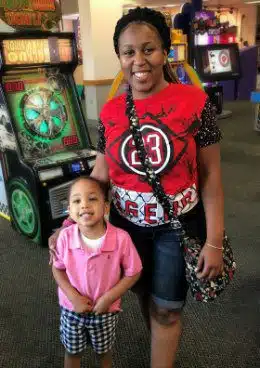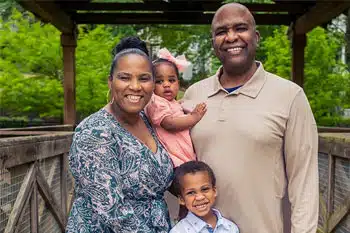
Some couples who adopt a baby decide to adopt again a few years later to provide their first adopted child with a sibling. Each birth family’s open adoption may look very different, resulting in two types of adoption.
With an open adoption of a second child, you will arrange the post-adoption contact and visitation preferences with a new birth mom. That means you may possibly be managing this for two children with two different birth families. Of course, it also means that there are more people to love and cherish your children.
As your child observes their sibling’s adoption play out, they may begin asking questions about their own adoption. This is good, as it encourages an open conversation about the loving choice that is adoption today.
How Will Two Types of Adoption Affect Our Children?
It’s natural to wonder about the impact of one open adoption relationship on the other child. Will they feel jealous? Will one child have a stronger bond than the other?
Recognize that your children will have two different birth families and two types of adoption. Do your best to create an environment that encourages open dialogue, acceptance, and understanding. Emphasize the significance of these relationships while celebrating the love and commitment you share as a family.
How Can We Support Our Child Who Doesn’t Have an Open Adoption?
- Acknowledge the differences with compassion – Acknowledge your child’s emotions of jealousy or rivalry. Provide them a safe space to express themselves and promote empathy and understanding. Let them know that they can always come to you with questions or feelings.
- Talk about your child’s birth parents respectfully – Even if you don’t have much information, you can share the information you do have. Speak kindly about your child’s birth parents and point out anything your child may have in common with them.
- Reinforce your child’s value in your family – Because they have a different story, your child may be worried that something is missing. Reassure them that they were chosen with love, their adoption was so meaningful to you and that you are always there to listen.
- Provide meaningful ways to connect – Encourage your child to write letters or draw pictures for the birth parents, even if they are not sent. Maybe even celebrate birth parent birthdays. There are a lot of individual ways to honor their birth family.
- Be open to future contact – If one of your children’s birth mothers seems to avoid contact after the adoption, it may be that she doesn’t feel emotionally ready to receive updates just yet. We’ve heard from many birth mothers that they want to be in a healthier place to get the updates so they can be excited and happy about getting them instead of sad.
Try not to panic if one of your child’s birth mothers hasn’t been very responsive lately. It doesn’t mean that she’s trying to pull away from you. Give her the benefit of the doubt. She probably has a lot going on right now. She may also feel insecure about how to interact with you. Remember that birth parents experience tremendous amounts of grief, guilt, and shame that can ebb and flow at times.
It is unrealistic to expect the same level of involvement or connection from each birth mother, as this can create unnecessary stress. Although this may be emotionally challenging at times, remember that people grow and evolve. Remain committed to continuing to work to maintain a healthy connection. - Celebrate each child’s story – Avoid comparing stories and just celebrate each child’s journey into your family and how it has completed your family. This lets them know that they are loved, valued and valid.
Get a Real-Life Glimpse at Two Types of Adoption
Lifetime adoptive mother Emily shares about her relationships with her sons’ birth mothers. People can easily misunderstand adoption relationships until they see them through the experiences of actual adoptive families and birth parents who united for a child’s adoption. In Emily’s story, you’ll discover how open adoption allows for a flexible and respectful relationship between adoptive families and birth mothers!

The relationship that we have with the birth mothers of our two sons is very near and dear to my heart, as I sincerely love these women. Their sacrifice allowed me to grow my family! The Lord chose those two women to help grow our family. As a result, we now have an extended family through our children.
Our relationship with the birth mother of our first adopted son, William, began upon meeting her a few days after his delivery. The agency facilitated a simple first meeting. After speaking with her and praying for her, we promised to send updates and photos via the agency.”
An Evolving Relationship
Emily continues, “This promise mutually and quickly evolved into communicating directly through private e-mail accounts. As we both reached out every few months, we were able to stay connected, share, and build a joyful relationship! Her emails never expressed regret or remorse about her adoption decision. She was genuinely interested in what we had in common—a precious boy that was now a part of both our families.

We continue to communicate with William’s birth mom via e-mail on a regular basis, and try to visit in person approximately once a year. It is a joy sending photos to celebrate the milestones of William while in return reading about and seeing the life of his half-siblings. One of my favorite e-mails was when she told me “Happy Mother’s Day” and let us know that she was baptized and got married!”
Our Son Samuel’s Adoption
“Sending happy emails and photos to William’s birth mom saddens us because we do not have a relationship with the birth mother of our youngest son, Samuel. He was adopted through a last-minute situation, and even his birth mother was unaware of her pregnancy; we received a phone call about him a few hours after he was born and without hesitation, immediately welcomed him into our family.

While we are saddened we haven’t been able to connect with Samuel’s birth mother and share milestones as we have done with William’s birth mother, we do not take her lack of interest personally. We understand and sincerely respect her ongoing decision to have space. Our agency recently heard from her, and she is very happy with the adoption placement. We regularly pray for her and despite whether or not the adoption remains closed, she will forever hold a close and special place in our lives.”
Can We Avoid Having Two Types of Adoption?
Some adoptive parents seeking to adopt a second time hope to have the same type of open adoption with both birth mothers. They express sentiments like, “We wouldn’t want one child to have visits with a birth mother and not the other – it would just seem unfair and maybe confusing.”
There are always differences you’ll have to explain to your children, even when you plan for them not to be. Consider Joe and Megan, who adopted two children from Lifetime. Both sets of birth parents agreed to exchange pictures and letters. Dawn, their son’s birth mother, replies just two or three times a year. Sarah and Jake, their daughter’s birth parents, eagerly respond to Joe and Megan’s emails with updates from their own lives, including photos of themselves. They send birthday and Christmas gifts to their daughter.
Everyone has their own story, and it is our job as parents to be sensitive to our child’s needs and share information at an age-appropriate level. Dawn’s lack of contact with Joe and Megan doesn’t mean she doesn’t care about her son. Similarly, just because Sarah and Jake stay in touch doesn’t mean they love their daughter more. They are just different people in different circumstances.
All adoptions are different. And when I speak with a family who wants to limit their preferences to try to make things the same, I strongly encourage them against it. You can have two similar scenarios, like Megan and Joe, with completely different outcomes. In adoption, flexibility will always serve you well.
Many more differences can arise in similar adoptions, such as differences in appearance, talents, medical needs, and so much more!
Find your level of comfort with contact, and go with that. Please don’t restrict your preferences simply in hopes that you will have cookie-cutter adoptions. As much as they may seem alike, there will always be differences!
Encouraging Positive Relationships with Birth Parents
Sometimes, even when you have an ongoing relationship with the birth parents, one or both of them may take a step back and stop contact for a period. This is normal. It’s important to continue fulfilling your promise to send updates, even if you don’t receive any response. When birth parents step back, they are often doing so to allow themselves to grieve. This doesn’t mean they are no longer interested in hearing about their child; they may simply need some space. There’s no guidebook for adoptive parents on how to handle this situation, but sticking to your promises is crucial.
Adoptive parents often want to maintain contact with birth parents through email, texting, phone calls, etc., which is great for building a strong relationship. However, if not handled delicately in the first year, it can lead to resentment, distrust, and negative feelings on either or both sides of the adoption. The good news is that these issues can usually be prevented. As adoptive parents, it’s essential to adhere to the contact agreement with the birth parents and give them time to grieve without reacting negatively or overanalyzing their words.
Editor’s Note: This article was originally published on January 24, 2019, and has since been updated.
As Vice President of Lifetime Adoption, Heather Featherston holds an MBA and is passionate about working with those facing adoption, pregnancy, and parenting issues. Heather has conducted training for birth parent advocates, spoken to professional groups, and has appeared on television and radio to discuss the multiple aspects of adoption. She has provided one-on-one support to women and hopeful adoptive parents working through adoption decisions.
Since 2002, she has been helping pregnant women and others in crisis to learn more about adoption. Heather also trains and speaks nationwide to pregnancy clinics to effectively meet the needs of women who want to explore adoption for their child. Today, she continues to address the concerns women have about adoption and supports the needs of women who choose adoption for their child.
As a published author of the book Called to Adoption, Featherston loves to see God’s hand at work every day as she helps children and families come together through adoption.





0 Comments